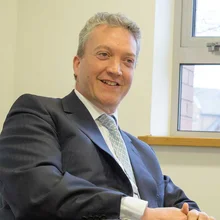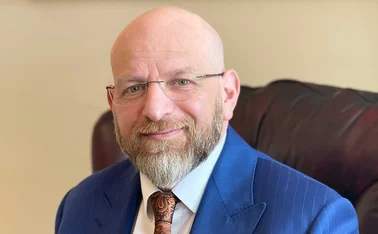
Broking success: Tom Bartleet, CEO of Erskine Murray Insurance Brokers

Client focus: Erskine Murray Insurance Brokers’ CEO Tom Bartleet tells Insurance Age why culture is an important consideration for a successful acquisition and how technology will save customers time and money
▶ How did you get started in insurance?
I studied economics at university. I left and thought I wanted to be a lawyer so I started working in the City. After about six months I realised everybody else was harder working, more intelligent, more ruthless and I thought the work was boring. My dad was an underwriter in Lloyd’s and he suggested to me that I’d find insurance broking as easy as falling off a log. I started working at Willis in 1990 and stayed there for 20 years.
▶ What is the history of Erskine Murray?
After 20 years I had done pretty much all the jobs I could do at Willis and thought if I was any good I should go and do it for myself. I raised some capital and left Willis on very good terms in 2011. I cold-called 40 brokers within an hour and a half of where I live and asked if they wanted to sell me their business. In May 2012 I acquired Chesham Insurance Brokers and set about trying to grow that business as a platform for the next stage of my career.
I joined the Willis Commercial Network in 2012. Then there was a pivotal moment – being able to have the opportunity to acquire Willis’ commercial business in England. We bought this office here in Leicester in 2013 and a wonderful set of clients and great people and were able to use that as a real platform for growth. In 2016 we rebranded as Erskine Murray, which is my mother’s maiden name.
▶ Have you made any other acquisitions?
We bought Offley Insurance Brokers in September last year. Through the Willis acquisition we have a national base of clients and we had a small presence in the North West, but we wanted some critical mass to service those clients and a base to grow from up there. In December we acquired Asciak Holdaway Merritt, who are specialists in professional indemnity for architects and engineers. That gives us a base in the South and a really exciting specialism.
We want to build a great business that people are proud to work for and do the right thing by the clients

▶ What do you look for in potential acquisitions?
Specialism, culture and quality of the people. When I say culture that’s about wanting to be part of something that’s going to continue into the future rather than a private equity owned consolidator roll out. We want to build a great business that people are proud to work for and do the right thing by the clients.
▶ What’s the local market like in Leicester?
There’s a reasonable number of brokers here. We’re generally under-represented in the local market here because of our history of it being a national hub. But we’re working hard on changing that at the moment. We’ve hired a head of sales and development locally recently.
▶ Are there any benefits of being based here?
Being in the middle of the country is a positive and the transport links are good. People are everything in this business and we can just about recruit them from the Birmingham market. We can access some talent but not as much as I would like. It’s not a problem, but you always want a bigger and better pool.
▶ What are the key differences in what you do now from when you worked at Willis?
The skills you need are similar. You need to be able to communicate and to have strategic input. But it’s the strategic and leadership piece that’s much more important. The people when working in a large broker are pretty competent and some are very competent, where in a small business everybody has to be pulling their weight. You try to hire the best people you can afford at any point in time.
▶ Which insurers do you think provide the best service?
We have a broad panel of insurers and they have their strengths and weaknesses. What we’re trying to do is work closely with insurers that want to use technology to support our clients with greater efficiency and better quality of service. I really want to do away with the administration headache that clients need to pay for. We have a strong focus on e-trade.
▶ Who are your main competitors?
We don’t really have individual companies that are our major competitors. It’s everybody from a very small local broker to competing with the nationals and globals.
▶ Do you worry about disruptors coming into the market from outside of the sector?
It’s one of the biggest risks to the industry. However, the barriers to entry are quite high in a regulated space. The relationships with customers, as long as you’re adding value, also provide quite high barriers. The key for us is to maintain both relevance and to try to stay ahead using all the technology that we can and allowing our clients to interact with us through the channels that they want. We need to provide them with the choices and the service they expect and the speed of response.
I really want to do away with the administration headache that clients need to pay for. We have a strong focus on e-trade
▶ What is your biggest challenge?
Our biggest challenge is organic growth in an economy that isn’t necessarily growing strongly. We have to work hard on differentiating ourselves with new and existing clients to retain them and provide a fantastic service to them. We do that through training our people, through products and service and using technology to deliver that service. Other challenges are integrating our current acquisitions. That’s going well at the moment.
▶ What do you see happening in the broking sector in 2018?
Further consolidation and those consolidators working hard on integration. Possibly some change in ownership as those consolidators themselves have to either refinance or decide to sell themselves. In the next year that’s likely
to happen.
▶ Where would you like the business to be in five years?
I’d like us to be viewed as a leading, independent broker giving advice in the commercial and high net worth space. Hopefully we’ll be innovative in terms of both product and proposition but also in service and underlying technology.
▶ Where do you see the biggest opportunities?
From my perspective consolidation is a good thing because it gives us a real USP. It’s difficult to differentiate yourself in the broking space. Being an independent with no plans for a sale and no private equity ownership is a real differentiator that our clients believe is meaningful. I also think that knowing who we work for – the client – and not owning an MGA or an underwriting agency marks us out. We only work for one client and I don’t have to worry about underwriting profitably or inherent conflicts in underwriting.
Only users who have a paid subscription or are part of a corporate subscription are able to print or copy content.
To access these options, along with all other subscription benefits, please contact info@insuranceage.co.uk or view our subscription options here: https://subscriptions.insuranceage.co.uk/subscribe
You are currently unable to print this content. Please contact info@insuranceage.co.uk to find out more.
You are currently unable to copy this content. Please contact info@insuranceage.co.uk to find out more.
Copyright Infopro Digital Limited. All rights reserved.
As outlined in our terms and conditions, https://www.infopro-digital.com/terms-and-conditions/subscriptions/ (point 2.4), printing is limited to a single copy.
If you would like to purchase additional rights please email info@insuranceage.co.uk
Copyright Infopro Digital Limited. All rights reserved.
You may share this content using our article tools. As outlined in our terms and conditions, https://www.infopro-digital.com/terms-and-conditions/subscriptions/ (clause 2.4), an Authorised User may only make one copy of the materials for their own personal use. You must also comply with the restrictions in clause 2.5.
If you would like to purchase additional rights please email info@insuranceage.co.uk








